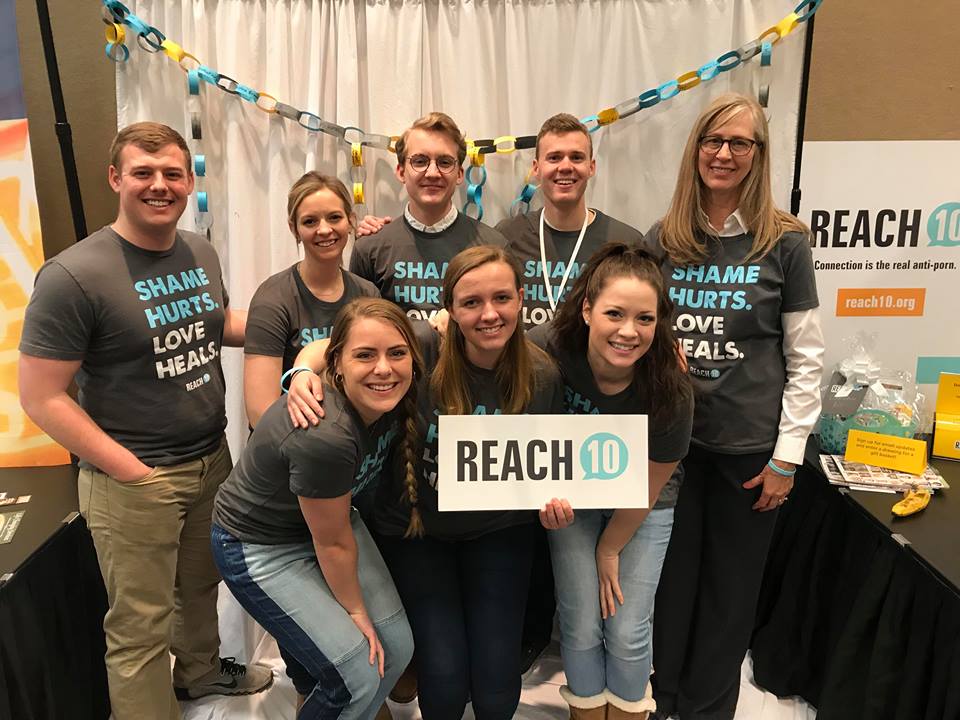
BYU student Madison Dunne is an intern for Reach 10, a nonprofit organization devoted to changing the culture surrounding pornography.  Reach 10 differs from most anti-pornography organizations because they focus not only on why pornography use is wrong, but also on how we can reach out and help. Their motto captures their vision:
Reach 10 differs from most anti-pornography organizations because they focus not only on why pornography use is wrong, but also on how we can reach out and help. Their motto captures their vision:
Connection is the real anti-porn.
Reach 10’s goal is to replace the pervading culture of shame and silence with a culture of connection and hope. By interning for Reach 10, Maddie is contributing to this progressive culture surrounding pornography. Her vision echoes Reach 10’s. “I want to be a citizen within the community that knows how to help people.”
Shame and Silence
Using shame as a tool to motivate a change in behavior is “really destructive and not really helpful at all.” Madison continues:
I think most times people assume that if you shame someone enough, then people will feel bad enough about it that they’ll stop doing it. But it’s actually really destructive when it comes to problems of pornography, because then people who were struggling with that feel like they can’t trust the people they’ve been talking to. They feel worse about themselves. It’s this awful cycle because they’ll watch pornography, and then they’ll feel bad about themselves, and then they reach out for help, but then that person they reached out to is also tearing them down, so then they go back to it.
Brené Brown claims that what shame needs to grow is secrecy, silence, and judgment. Judgmental statements never help a person feel understood. Here is a clip of Brown explaining what shame is and how we can alleviate shame.
If secrecy, silence, and judgment breed shame, then we need to advocate the opposite: honesty, openness, and empathy. We all need to create a safe place for people to feel accepted and understood. “Shame cannot survive being spoken and being met with empathy,” Brown explains.
Why Reach 10 is Different

Reach 10 is different from other anti-porn organizations because they replace shame and silence with connection and compassion. Reach 10 advances the pornography conversation.
The nonprofit’s name comes from its core invitation: “reach out to 10 people with a message of hope and connection.” Founder Vauna Davis firmly believes that the more we talk about pornography, the more we can normalize the topic. The more normalized discussions about pornography become, the safer people will feel when they want to receive help. The safer people feel, the freer they will be from fear and shame.
Part of Madison Dunne’s responsibilities as an intern is to create instructional videos on how to talk about pornography within our different relationships:
Yourself
Romantic relationships
Friendships
Family relationships
Community leaders
Along with the videos, Reach 10 frequently hosts events where speakers such as Elder Holland speak about how to heal from the effects of pornography. Other speakers include men and women who have overcome pornography issues themselves. They provide hope to those who are still struggling with pornography.
Reach 10 reaches out through these events and videos mentioned, as well as through social media and blogs. Blogs and social media posts are all geared towards learning how to eliminate shame, and how to discuss pornography.
How you can get involved
 One valuable way we can strengthen our communities is through the way we address this topic at church. The Mormon Channel video, “Pornography: Is there hope?” addresses the struggle one young woman, Elizabeth, had when she felt shamed at church. We can avoid those types of situations ourselves by learning how to address these issues.
One valuable way we can strengthen our communities is through the way we address this topic at church. The Mormon Channel video, “Pornography: Is there hope?” addresses the struggle one young woman, Elizabeth, had when she felt shamed at church. We can avoid those types of situations ourselves by learning how to address these issues.
Madison goes one step beyond simply talking about pornography. She implores us to provide help in the difficult ways, while also not taking responsibility for a friend’s problem:
I think it’s important to not just be there for the person and tell them that you’ll help them through it. You really need to help them find professional help and programs so that they’re actively working through it. And if that’s not helping, then it’s because they don’t want to change.
Madison rightly emphasizes the importance of not diffusing shame from the person struggling to the person helping him or her. An anonymous friend of mine adds, “There’s shame on both sides, and both of those are not okay. You shouldn’t shame people who are going through it, but also if your partner or spouse is going through it, you shouldn’t shame yourself, either. The way to get through it is frank, open communication.”
Frank, open communication is exactly what Reach 10 is all about. Along with reaching out to 10 people, Reach 10’s website also includes a challenge for those who want to get even more involved. The challenge includes watching an introductory video, reading a Reach 10 blog post, getting connected on social media, and sharing something on Facebook with the #reach10 hashtag.
We can all respond to the Reach 10 call to talk to ten people about pornography. Learning how to talk about pornography is the only way to shift the culture from silence and shame to love and empathy.





